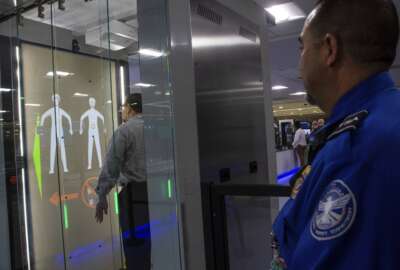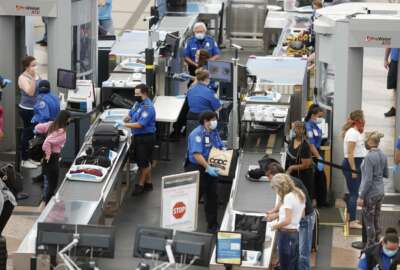Hubbard Radio Washington DC, LLC. All rights reserved. This website is not intended for users located within the European Economic Area.
On Air: Federal News Network
Trending:
Worry more about attrition, not the 90-day hiring freeze, human capital experts say
President Donald Trump's hiring freeze memo leaves plenty of room for agency interpretation, human capital experts say. Specifically, it lets agencies ask for e...
Listen to Nicole Ogrysko on Federal Drive with Tom Temin
President Donald Trump’s hiring freeze, which he announced Monday with the signing of an executive memo, may sound dramatic. But federal human capital experts say the memo leaves plenty of room for agencies to ask for short-term exemptions and even more opportunities to think strategically about their long-term workforce plans.
“The freeze is meant to pause, allow there to be analysis of what can make this better,” White House Press Secretary Sean Spicer said during a briefing with reporters Tuesday afternoon.
This period of time as agencies “pause” — roughly 90 days while the Office of Management and Budget and Office of Personnel Management develop a long-term plan to reduce the size of the federal workforce through attrition — is key for agency chief human capital officers, said Ron Sanders, a former associate director at OPM and fellow at the National Academy of Public Administration.
“I would personally concentrate my efforts on the broader plan, because that’s where the payoff is going to be, working with a new cabinet secretary or deputy secretary to prioritize agency staffing,” he said. “What I would hope is that’s done in a strategic way. The less strategic, least painful, but most adverse approach is to do … ‘salami slicing,’ across the board cuts; everybody shares in the pain equally.”
It’s unclear what kind of approach OMB might take to workforce attrition. Some Republicans and conservative think-tanks have suggested plans in the past to trim the federal workforce through attrition. For example, for every three employees who leave, an agency could hire one person in return.
“It’s not the freeze that’s the problem,” Sanders said. “It’s attrition. Attrition is random. We know that the best people with the most marketable skills are the most likely to leave. You end up with reverse retention. You end up keeping the wrong people.”
Janet Christ, a former chief human capital officer for the Federal Housing Finance Board and now independent federal job consultant, said attrition was possibly the “worst” way to trim the federal workforce.
“You lose good people,” she said. “You lose your long-term experience, because anyone eligible to retire that leaves, you can’t fill behind them. Good people can find jobs in the private sector or elsewhere. It’s the employees that you want to lose that stay forever.”
But those kind of cuts don’t often let agencies consider various mission or programmatic needs.
“The plus side of doing things by attrition is you’re not involuntarily taking someone’s job away from them,” said Jeff Neal, former CHCO for the Homeland Security Department and now senior vice president at ICF International. “That’s a very good thing. The downside of it is it doesn’t allow you to do any tailoring of the workforce to try to get rid of the positions you want to get rid of and keep the ones you want to keep.”
At his press briefing Monday, Spicer said the President’s landing teams have been meeting with agencies to review ways they can find more efficiencies and get rid of duplicative positions.
The memo also leaves room for interpretation. Agency heads can exempt “any positions that it deems necessary to meet national security or public safety responsibilities,” which Neal said is a rather broad statement.
The short-term freeze applies to all agencies except military personnel. Neal said he expects agencies will likely ask for exemptions to public health and temporary IRS customer service positions.
Agencies may also ask to exempt cybersecurity positions. The Obama administration made cyber hiring a major priority in 2016 and hired at least 6,000 new professionals last year.
Sanders said agencies’ slow progress in recruiting top cyber talent may stall if agencies cannot strategically plan for their mission needs in cyber down the road.
“I worry less about that in the immediate term and [would] focus more on what do I want my agency’s workforce to look like over the long term?” Sanders said. “It may be smaller; that’s a given. The President has mandated that. But if it is going to be smaller, what’s the right mix of skills and experience in order to still accomplish the mission?”
Long-term cuts through attrition may hinder agencies’ push to recruit more young people into government, another key area of concern for some agency CHCOs.
More Hiring/Retention News
“If you can’t hire a lot of people, you typically go for hiring the most qualified people you can find, and that’s generally not someone who’s 22-years-old [and] right out of school,” Neal said. “It’s someone who has some experience. Hiring freezes, or partial hiring freezes, tend to exacerbate the problems with too few young people in government.”
The memo specifically prevents agencies from filling vacant positions that existed as of Jan. 22, 2017.
Neal said the January to May timeframe is often when agencies recruit new professionals from colleges and universities.
“You’re making offers to a lot of people now if you’re doing college recruiting,” he said. “[Agencies] can’t do that now. If you can’t do your college offers now, then you’re probably going to miss some of the better talent.”
Turnover is also often high in January, as the month is traditionally a popular month that eligible federal employees choose to retire.
But Christ said she doesn’t anticipate that the hiring freeze will have a huge impact in 90 days.
“It’s temporary,” she said. “There’s still over 100 jobs posted just in the D.C. area today. … They’re still moving forward, and chances are [agencies] are probably going to take them through the end of the closing date and hang on to the list [of job applicants] and decide to move forward with it when the freeze is lifted.”
An OPM spokesperson said the agency is working with OMB on a response to the hiring freeze memo.
Rep. Mick Mulvaney (R-S.C.), Trump’s nominee to be the next OMB director, said during Tuesday’s Senate Budget Committee’s nomination hearing that he wasn’t yet familiar with the details of the hiring freeze memo, which has the concern of several Washington-area lawmakers.
“Do you worry, like I do, about backlogs in processing Social Security disability claims, veterans benefit claims [and] backlogs in getting drugs permitted to go on the market?” asked Sen. Tim Kaine (D-Va.), during a round of questions at Tuesday’s hearing.
“I worry about inefficiencies at many levels of government,” Mulvaney said.
“I’m concerned that hiring freezes in some of these areas where we’re already seeing backlogs could have the effect of even making it harder for citizens to get the services they need,” Kaine added.
“I don’t think you’re wrong to be concerned about it, senator, [but] I don’t think it automatically follows that hiring more people will automatically create more efficiency,” the OMB nominee said.
Copyright © 2024 Federal News Network. All rights reserved. This website is not intended for users located within the European Economic Area.
Nicole Ogrysko
Nicole Ogrysko is a reporter for Federal News Network focusing on the federal workforce and federal pay and benefits.
Follow @nogryskoWFED
Related Stories
Related Stories
-
Since recent pay raise, fewer feds leaving TSA Hiring/Retention
-
Pathways Program overhaul seeks to open doors to more candidates Hiring/Retention





